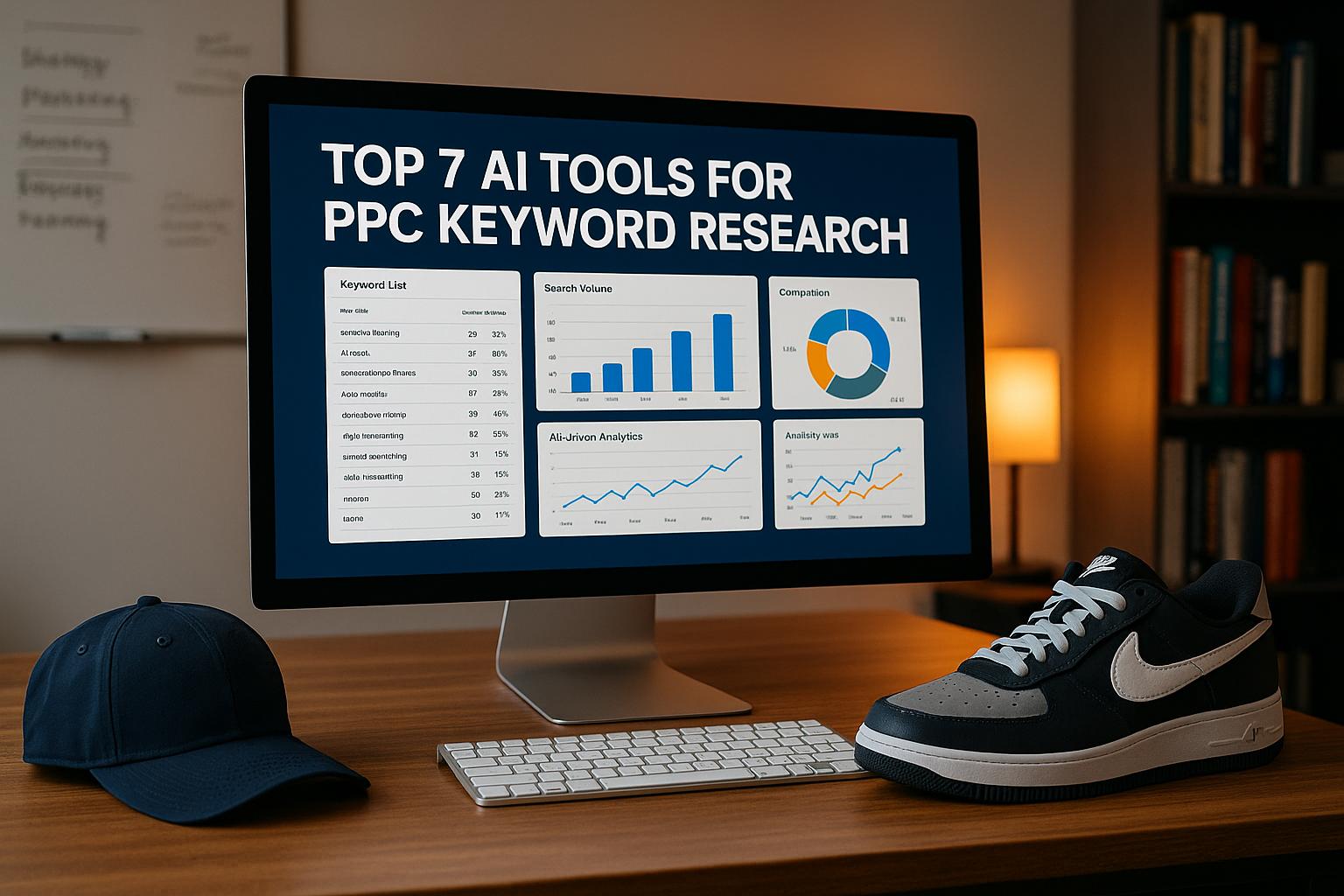AI is reshaping marketing, and leaders must quickly develop AI expertise to stay competitive. By 2025, the AI marketing market is expected to grow to $47.32 billion, with 88% of marketers already recognizing AI as essential. However, a major skills gap persists, with only 25% of marketers confident in their AI abilities. To bridge this gap, marketing leaders need to focus on:
- AI Knowledge: Learn machine learning basics, data analysis, and prompt writing to make informed decisions.
- Leadership Skills: Guide teams through AI adoption, address resistance, and align AI tools with business goals.
- Ethical Practices: Ensure transparency, address algorithmic bias, and comply with data privacy laws.
- Continuous Learning: Invest in training programs, consulting services, and AI-powered newsletters to stay updated.
Future Proof Your Leadership: AI Skills for Executives
Challenges in Adopting AI-Driven Marketing Strategies
Adopting AI-driven marketing strategies isn’t as simple as buying the latest technology. For marketing leaders across the United States, it’s a multi-faceted challenge involving technical gaps, ethical dilemmas, and cultural resistance. These hurdles highlight the complexities of making AI a cornerstone of marketing efforts.
Skill Gaps and Knowledge Deficits
One of the biggest obstacles is the critical AI skills gap, with 63% of decision-makers reporting that their organizations lack the expertise needed to leverage AI effectively. This gap isn’t just about technical know-how – it extends to AI literacy and understanding the ethical considerations of using these technologies.
The numbers tell a troubling story: only 25% of marketing professionals feel confident in their AI abilities, while 45% cite insufficient training as a barrier. This lack of confidence has ripple effects. Teams that don’t fully understand AI tools may misuse them or avoid them altogether, fueling skepticism rather than progress.
The stakes are enormous. 94% of HR leaders agree that failing to reskill or upskill employees in AI can lead to competitive disadvantages, lower productivity, and compliance issues. On the flip side, organizations that close this skills gap are 10 times more likely to see AI as a core capability, often doubling their sales growth in the process.
What complicates matters further is that AI expertise isn’t uniform across roles. For instance, a content marketing manager needs different AI skills than a data analyst or campaign strategist. Marketing leaders must identify these role-specific needs while also fostering a broader understanding of AI across their teams. Without this foundation, ethical and regulatory challenges become even harder to tackle.
Ethics and Data Privacy Concerns
The ethical and legal dimensions of AI present another layer of complexity. Marketing leaders must ensure compliance with privacy regulations like the CCPA and other state laws while addressing algorithmic bias and transparency issues.
Data privacy is a major concern. Leaders need to understand how AI systems handle personal information and implement safeguards to prevent misuse or unauthorized access. Failure to do so can lead to legal penalties and reputational damage.
Algorithmic bias is another pressing issue. AI systems often rely on historical data, which can unintentionally reinforce existing biases. This can result in discriminatory practices in areas like customer targeting or pricing. Identifying and addressing these biases requires expertise that many teams currently lack.
Transparency is equally challenging. Customers and regulators increasingly demand clarity around AI-driven decisions, but many AI systems operate as “black boxes,” offering little insight into how they reach conclusions. Marketing leaders must invest in systems that provide explainable outputs, even as the regulatory landscape continues to evolve.
Staying compliant isn’t a one-time effort. Laws and industry standards are constantly changing, requiring flexible governance frameworks and dedicated resources. For many organizations, this adds yet another layer of complexity to an already challenging transformation.
Company Resistance to Change
Even with the right skills and compliance measures in place, organizational resistance can stall AI adoption. This resistance can come from executives hesitant to invest in AI or employees worried about job security.
Cultural attitudes toward AI vary widely. Some organizations embrace innovation, while others see AI as a risky or unnecessary venture. Research from McKinsey & Company reveals that up to 70% of change programs fail, often due to employee resistance and a lack of leadership support. In many cases, fear of job displacement overshadows the potential for new opportunities and skill development.
Governance issues add to the challenge. Many organizations lack clear policies for AI implementation, leading to confusion over budgets, decision-making authority, and success metrics. Integration problems between new AI tools and existing systems can further entrench resistance, especially among teams accustomed to traditional workflows.
Overcoming these barriers requires addressing both the emotional and practical aspects of change. Marketing leaders must clearly communicate the benefits of AI, providing training and resources to ease the transition. Building a culture of continuous learning and experimentation can help employees embrace AI without fear of failure or job loss. By tackling these challenges head-on, organizations can unlock the full potential of AI-driven marketing strategies. This remains a critical step in their digital transformation journey.
Core Skills for AI-Driven Marketing Leadership
Leading a marketing team in an AI-driven world isn’t just about knowing the latest tools. It’s about combining technical know-how with strong leadership and a clear ethical compass. These skills help bridge the gaps and overcome resistance, ensuring AI is integrated thoughtfully and effectively. Below, we break down the essential competencies for marketing leaders to thrive in this evolving landscape.
AI Knowledge and Data-Based Decision Making
To make smart decisions about AI investments and strategies, marketing leaders need a solid understanding of AI technologies, machine learning basics, and algorithms. This foundation helps them navigate critical areas like data management, data analysis, prompt engineering, and marketing automation. With hands-on experience, leaders can better grasp what AI tools can – and cannot – do.
"AI excels at crunching data and finding patterns, but it doesn’t know our audience the way we do. We always step in to interpret the results and make adjustments. For me, it’s a tool that sharpens decision-making, not replaces it. There’s still plenty of human judgment and creativity involved, and that’s where the magic happens." – Tasha Tadi, Marketing Manager at eBallot
Consider this: every day, 402.74 million terabytes of data are generated. While AI can process this data in seconds, understanding the "why" behind the patterns still requires human insight. Leaders must also master the art of writing clear, precise prompts to extract meaningful results from AI tools.
"Effective prompt writing is clear and specific. Instead of saying, ‘Show customer insights,’ we’d ask, ‘What are the top three products customers aged 25-34 purchased last month?’ This saves time and gives us better results. It’s all about asking the right questions to get meaningful answers." – Adnan Jiwani, Assistant Manager Digital Marketing at PureVPN
AI tools can be game-changers for personalization, segmentation, predictive analytics, and optimizing marketing budgets. Leaders who effectively apply these insights can make faster, more accurate decisions while freeing up their teams for strategic initiatives. By 2025, 95% of data-driven decisions will involve some level of automation, according to Gartner. However, technical expertise alone isn’t enough – leaders must also focus on managing their teams and embracing change.
Change Management and Team Leadership
Introducing AI into marketing workflows often comes with challenges, from employee skepticism to practical hurdles. That’s where strong change management skills come in. Leaders need to guide their teams through this shift, showing that AI is here to enhance – not replace – their roles.
Clear communication is key. Leaders must explain AI’s purpose and demonstrate how it complements human creativity and expertise. Encouraging a mindset of strategic thinking, innovation, and agile problem-solving helps teams adapt and thrive. Creating a culture where experimentation is welcomed – and failure is seen as a learning opportunity – is equally important. Safe spaces for testing AI tools allow teams to explore their potential without fear.
The demand for specialists with AI and machine learning expertise has skyrocketed, tripling between 2015 and 2019. This trend shows no signs of slowing down. To succeed, marketing leaders must act as bridges between data scientists, domain experts, and decision-makers, ensuring AI initiatives align with broader business goals.
Ethical AI Practices and Consumer Trust
Ethical AI isn’t just the right thing to do – it’s also a competitive advantage. A whopping 85% of customers are more likely to trust companies that use AI responsibly. For marketing leaders, building trust starts with transparency.
Teams need clear guidelines on when and how to disclose AI use in campaigns. This includes labeling AI-generated content, offering user controls, and being upfront about AI’s role in decision-making.
"Transparency is paramount to maintaining consumer trust." – Ellen Nielsen, Formerly of Chevron
To ensure ethical practices, leaders should conduct regular audits to evaluate the fairness, transparency, and impact of AI-driven initiatives. Establishing clear policies around AI use and enforcing human oversight at every stage are crucial steps.
Real-world examples highlight the importance of ethical leadership. In 2023, Dove’s "AI and Real Beauty" campaign exposed how generative AI often produced unrealistic, Eurocentric images when asked to depict "beautiful women." In response, Dove created the "Real Beauty Prompt Guidelines", offering a framework for more inclusive AI-generated imagery.
Similarly, Tapestry, the parent company of Coach and Kate Spade, developed a proprietary AI system called Tell Rexy. This tool enhances customer service by incorporating continuous feedback from human representatives, showing how human intervention can improve AI while staying true to brand values.
When it comes to data, leaders must prioritize minimization, anonymization, and security. It’s not just about what data AI systems can collect – it’s about what they should collect. Striking a balance between personalization and privacy is essential to respecting consumer boundaries.
The benefits of ethical AI go beyond customer trust. Internally, 74% of employees report higher job satisfaction when their company prioritizes ethical AI practices. By championing responsible AI use, leaders not only protect their organizations from legal and reputational risks but also set the stage for sustainable, long-term success.
sbb-itb-d6d4d8b
Effective Strategies for Upskilling Marketing Leaders
Addressing skill gaps and overcoming resistance to AI adoption requires a well-rounded approach. With 63% of marketing leaders planning to invest in generative AI by 2025, the time to act is now.
Taking Executive Education Programs
Executive education programs offer marketing leaders focused, actionable AI training, even with demanding schedules. These programs are designed to bridge the gap between theory and practice, equipping leaders with the tools to navigate the AI-driven future.
Columbia Business School offers two standout programs: "The Business of AI" and "AI-Driven Marketing Strategy", both priced at $10,250. INSEAD’s five-day "Leading AI and Digital Marketing Strategy" program costs €11,200 (around $12,100), focusing on growth at the crossroads of AI, marketing, and innovation. Meanwhile, Harvard’s "AI Strategy for Business Leaders" emphasizes strategic implementation, costing between $3,100 and $3,200.
"The challenge for every leader is to navigate continuous change. The digital era demands a new kind of organization."
– David Rogers, Academic Director in Executive Education, Columbia Business School
For leaders aiming to master transformation skills, UC Berkeley’s "Berkeley Executive Program in Digital Transformation and AI" costs $28,000 (or $25,000 with early application). Stanford’s "Digital Transformation: Leading Organizational Change in the Age of AI" is another option at $15,000. These programs focus on leveraging AI to drive organizational change.
Anand Shah, Verizon’s Director of Technology, shared his experience with Wharton’s "Leading AI and Digital Transformation" course, describing it as “a perfect mix of technology, innovation, and the change that is required for any business”. He highlighted how the program helped him align AI strategies with business goals while fostering a mindset open to risk-taking and execution.
| Program | Institution | Price | Focus Area |
|---|---|---|---|
| AI Strategy for Business Leaders | Harvard | $3,100–$3,200 | Strategic AI implementation |
| Advanced Certificate in Digital Marketing and AI | Kellogg | $5,200 | AI applications in marketing |
| The Business of AI | Columbia | $10,250 | AI in business |
| Leading AI and Digital Marketing Strategy | INSEAD | €11,200 | AI-driven marketing growth |
| Leading AI and Digital Transformation | Wharton | $12,875 | Organizational AI transformation |
In addition to formal education, consulting services provide hands-on AI integration for immediate impact.
Using Consulting Services and Tools
Collaborating with AI consultants can fast-track your team’s understanding and application of AI. These experts combine marketing expertise with data science and machine learning to uncover actionable insights from customer data. Look for consultants who offer end-to-end services, including data preparation, model development, solution deployment, and optimization. It’s also essential to prioritize explainable AI to ensure transparency in recommendations.
JeffLizik.com provides strategy development, 12-month marketing plans, and consulting on AI-driven marketing systems. One testimonial underscores their effectiveness:
"The Pareto Principle is in full effect in Digital Marketing. If your team isn’t capitalizing on the 20% of work that drives 80% of your marketing results, we need to talk."
Consultants can simplify complex tasks like predictive lead scoring and dynamic pricing. Starting with basic AI tools – such as email personalization or chatbots – can address immediate needs while providing a foundation for more advanced applications like predictive analytics. This approach allows your team to learn by observing and gradually take on more responsibilities.
While consulting services support operational goals, staying informed about AI trends is key to maintaining a competitive edge.
Getting Industry Updates with AI-Powered Newsletters
The AI landscape is evolving at breakneck speed, making it crucial for marketing leaders to stay informed. AI-powered newsletters offer a tailored approach, delivering content based on your specific interests, role, and reading habits. Unlike traditional newsletters, these advanced versions adapt to your preferences, ensuring you receive the most relevant updates.
JeffLizik.com also offers an AI-powered newsletter that delivers personalized insights, helping subscribers stay ahead of industry trends. Timing matters, too – emails sent midweek (Tuesdays and Wednesdays) between 9 a.m. and 12 p.m. see the highest engagement rates.
"Hyper-personalization is the future of digital marketing. With AI, businesses can tailor content, offers, and experiences to individual customers in real time. The more relevant your message, the stronger the connection – and that’s what drives engagement and sales!"
– Samuel Charmetant, Founder, ArtMajeur by YourArt
These newsletters go beyond updates, acting as continuous learning tools. They help leaders track market shifts, competitor strategies, and actionable insights to refine future campaigns. With the global AI market projected to grow from $305.90 billion in 2024 to $738.80 billion by 2030, staying informed is not optional – it’s a strategic necessity. By leveraging AI tools to analyze performance and competitor data, marketing leaders can turn information into a competitive advantage.
Building a Culture of Continuous Learning in Marketing Leadership
To keep pace with the rapid evolution of AI, creating a culture of continuous learning is essential. It’s not just about upskilling; it’s about reshaping how organizations approach skill development altogether. The need is clear: while 42% of companies cite a lack of skills as a barrier to AI progress, 82% plan to increase AI investments by 2025. This gap between ambition and capability highlights why fostering a learning-focused mindset is critical for marketing leaders.
Making Continuous Education Part of Leadership Roles
Embedding learning into leadership roles is one of the most effective ways to drive this change. Microsoft’s Satya Nadella exemplified this in 2014 by championing a growth mindset across the company. As Nadella famously put it:
"The learn-it-all does better than the know-it-all." – Satya Nadella
For marketing leaders, this means leading by example. Dive into AI yourself – experiment with tools, attend webinars, and share what you’ve learned. When leaders openly embrace curiosity and exploration, they inspire their teams to do the same.
Creating a safe space for experimentation is equally important. Teams are more likely to innovate and share lessons when they know mistakes won’t be punished. Recognize creative uses of AI, even if they don’t yield immediate financial results, and incorporate these efforts into performance reviews. Ask leaders about the new skills they’ve gained and how they’re passing that knowledge along. This approach shifts continuous learning from being a “nice-to-have” to a business priority.
By modeling this behavior, marketing leaders can set the foundation for aligning training programs with emerging AI trends.
Matching Leadership Development with New Trends
To stay ahead, leadership development must align with the latest AI advancements. Nearly 47% of organizations see workforce development as a top priority over the next 12 to 18 months. Focus training on critical areas like targeting, data-driven insights, automation, generative AI, and ethical considerations. Leaders need to understand how AI can analyze customer interactions, predict behaviors, and personalize content in real time.
Theory only goes so far – hands-on experience is what truly builds understanding. Encourage leaders to test AI tools themselves. For example, they might use ChatGPT for brainstorming content ideas, experiment with predictive analytics for lead scoring, or explore automated email personalization. A great example is Takeda’s collaboration with Slalom, which combined internal expertise with external training to jumpstart its AI transformation.
Collaboration across teams is also vital. Organize sessions where marketers and data scientists can work together to deepen understanding of data-driven insights and address potential AI biases. The goal isn’t to turn marketers into data scientists but to ensure they become informed users of AI who can make smarter, more strategic decisions.
Handling US-Specific Challenges
In the United States, regulatory and cultural hurdles add another layer of complexity to building a learning culture. Privacy laws like California’s CCPA and Virginia’s CDPA create a fragmented compliance landscape compared to the EU’s unified GDPR framework. Marketing leaders must be trained on how these regulations impact AI tool selection, data collection, and customer communication.
American consumers also demand more transparency about how AI influences their experiences, from personalized recommendations to automated service. As Anupa Rongala, CEO of Invensis Technologies, explains:
"Businesses embracing responsible AI will not only comply with regulations but also build long-term trust." – Anupa Rongala
Workforce development in the US often emphasizes individual responsibility and career growth. To make learning a priority, organizations should carve out dedicated time for it. For example, initiatives like “AI Fridays,” where leaders spend part of their week exploring tools or working on AI-driven projects, can ensure learning becomes a regular part of the workweek.
When HR and management collaborate to promote lifelong learning – by rewarding curiosity and offering accessible training opportunities – the benefits extend across the entire organization.
For more insights into AI-driven marketing strategies, visit JeffLizik.com.
Conclusion: Preparing Marketing Leaders for an AI-Driven Future
AI is already reshaping the marketing landscape. With leaders increasingly investing in generative AI and 75% of companies already seeing returns on their investments, the urgency to develop relevant skills has never been greater . This shift highlights the critical need for marketing leaders to enhance their AI expertise.
As Christina Inge aptly states:
"There is a saying going around now – and it is very true – that your job will not be taken by AI. It will be taken by a person who knows how to use AI. So, it is very important for marketers to know how to use AI."
To prepare for this transformation, leaders must act now in three essential areas. First, they need to build foundational AI skills, such as understanding machine learning, mastering predictive analytics, and gaining hands-on experience with tools like generative AI. Second, fostering organizational readiness is key – this includes addressing change management, implementing ethical AI practices, and encouraging collaboration with data and tech teams. Finally, establishing systems for ongoing learning will ensure adaptability as technology evolves.
The numbers tell a clear story: 78% of marketers report that AI reduces time spent on manual tasks, and 66% say it enhances personalized customer experiences . These aren’t distant possibilities – they are advantages available today for those who take the initiative to upskill and adapt.
For those looking to bridge the skills gap, resources like executive education programs and AI consulting services, such as those available through JeffLizik.com, offer practical solutions. Industry insights, AI-powered newsletters, and strategic consulting can further guide marketing leaders as they navigate this digital transformation.
The window for proactive learning is narrowing. By committing to continuous education and leveraging available tools, marketing leaders can confidently step into an AI-driven future. Those who embrace AI literacy, cultivate a learning-focused culture, and use available resources wisely will not only adapt but thrive in this evolving market. The real question isn’t whether AI will transform marketing leadership – it’s whether you’ll be ready to lead when it does.
FAQs
What steps can marketing leaders take to close the AI skills gap and prepare their teams for the future?
To address the AI skills gap, marketing leaders should prioritize focused training programs that highlight real-world uses of AI in marketing. Offering workshops, online courses, and interactive projects tailored to your team’s specific needs can make learning both relevant and impactful.
Beyond training, consider investing in reskilling efforts to help your team stay agile and adapt to emerging tools and technologies. Create an environment where collaboration thrives, industry insights are shared, and new ideas are encouraged. This approach not only equips your team for current demands but also prepares them to confidently face future challenges.
What ethical principles should marketing leaders follow when using AI, and how can they stay compliant with data privacy laws?
Marketing leaders should prioritize transparency, fairness, and accountability when incorporating AI into their strategies. This means actively working to prevent reinforcing harmful stereotypes or misusing personal data – both of which can erode trust and harm a brand’s reputation.
To ensure compliance with data privacy laws like GDPR and CCPA, marketers should take the following steps:
- Secure clear and explicit user consent before collecting any personal information.
- Collect only the data that is absolutely necessary for the intended purpose.
- Establish strong security protocols to safeguard data and prevent breaches.
By committing to ethical standards and following privacy regulations, marketing leaders can foster trust, strengthen customer relationships, and minimize risks tied to AI-powered initiatives.
How can marketing leaders create a culture that embraces continuous learning and innovation when adopting AI strategies?
To create an environment where continuous learning and innovation thrive, marketing leaders should prioritize open communication and psychological safety. This means fostering a workspace where team members feel at ease sharing their ideas and learning from missteps. By encouraging hands-on experimentation and celebrating even the smallest successes, leaders can spark both creativity and confidence within their teams.
Organized learning opportunities – like regular training sessions, innovation workshops, and collaborative projects across departments – play a key role in building skills and solving challenges. These efforts not only help teams grow but also prepare them to embrace AI-driven strategies and keep pace with the ever-changing marketing world.







